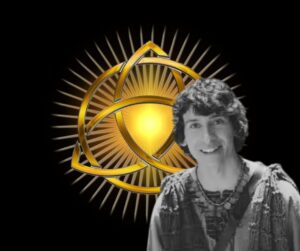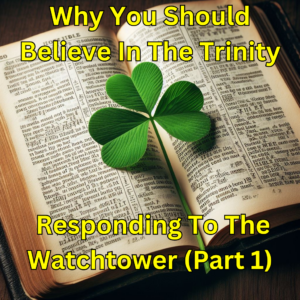In my book “Inference To The One True God”, I gave an argument for a while only the God of the Bible can be the God proven to exist by The Moral and Ontological Arguments. The Argument here is that the Moral and Ontological Arguments prove the existence of a being that is morally perfect. Given that the Moral Argument and the Ontological Argument are logically valid, and the premises of both of these arguments are true, it follows that a necessarily existent, morally perfect, omnipotent, omniscient, omnipresent, personal being exists.
–
Now, in order to be a morally perfect being, this being would have to exist as more than one person. If God is not a trinity then God is not love. This is because love requires three things: someone to love, someone to do the loving, and a relationship going on between the lover and the Beloved. If these three things are not present then love is not present. But before any human beings were created, God was all by himself. So if God was all by himself, who was there to love? God had no one to love! Given that God had no one to love, God couldn’t be love or loving until he created the first human beings or Angels or any persons other than himself. But in that case God could not be maximally great or be the the standard of morality, for in order to be maximally great and in order to be the standard of morality, God would have to be morally perfect, which he could not be if God were only a single person. But the Moral and Ontological Argument established the existence of a being who is indeed morally perfect and ergo maximally great. So how does one resolve this dilemma? The doctrine of the Trinity provides the answer. If God is a trinity, then God can be an intrinsically loving being, because if God is a trinity then all of the necessary requirements for love are present. You have a lover, you have a beloved, and you have a relationship between them. The Father loves the Son and the Son loves the Father. The Holy Spirit is the spirit of love. This is why I said in my book that only the trinitarian concept of God is compatible with the God demonstrated to exist by the Moral and Ontological Arguments. But the real kicker is that only Christianity has a God who is a trinity. Therefore the Moral and Ontological Arguments demonstrate the truth of Christianity.
–
However, I have recently encountered one objection to this philosophical argument for the Triune nature of the God of the Moral and Ontological Arguments. The objector argues that God was omnipotent even before he created the universe and he did not have an apparent outlet to display his power. The objector is arguing that according to my logic, we would have to argue that God could not be omnipotent without a physical universe. Why? Because without a physical universe, God would not be able to display any acts of power because God would be the only thing that could exist and God cannot cause any effects on himself. This would imply that either God is Not omnipotent, or he doesn’t need an outlet to display his power. In a similar way, we must conclude that if my logic is sound, then God really is not perfectly loving, or we must conclude that having other people to love is not necessary for God to be loving, and therefore God doesn’t have to be a trinity in order to be loving from eternity past.
–
God is omnipotent and did not have an outlet for that until he created the universe. There is a parallel there with God’s love.
–
Is this a good objection? I don’t think so. Let’s think about God’s omnipotence for a moment. Omnipotence is a modal property meaning that a being who is omnipotent has the ability to do anything that is logically possible. God can create out of nothing, God can make ax heads float in water, God can make a virgin pregnant, God can raise people from the dead, it cetera. It is a modal a tribute and just simply means that you have the ability to do anything that does not violate the laws of logic. Given that comma I don’t see why God would have to have a physical Universe in order to have the property of omnipotence. Omnipotence does not mean that you will do everything that is logically possible, it just means that if you are omnipotent you can do anything that is logically possible. It doesn’t mean that you will do everything that you are able to do, just that you are able to do it.
–
Love is different. Unlike the property of being powerful, Love Is not just pure potentiality. A person who is stranded on a desert island with no other people around may have the potential to be loving. It may be in his nature to be kind and compassionate and selfless and so on. Nevertheless if there are no other people around, he will never have the ability to express these attributes. This person will forever just have a loving potentiality, but will never have actual love. If God were only one person, then before he created any other beings, he would be like a machine that is turned off. This “Love Machine” would have the ability to be loving, but he would never actually be expressing that love. It seems very intuitively clear to me that a being who is constantly expressing love is a greater being than one who merely has the potential to be perfectly loving. But in order to be a being who is constantly expressing love and is not merely a being of potential love, this being would have to be a trinity.
–
In conclusion, this objector has not succeeded in showing that my Arguments for the Triune nature of the maximally great being of the Ontological Argument, and the being who is the standard of morality of the Moral Argument fail.
Share this:
- Click to share on Facebook (Opens in new window) Facebook
- Click to share on X (Opens in new window) X
- Click to print (Opens in new window) Print
- Click to email a link to a friend (Opens in new window) Email
- Click to share on Pinterest (Opens in new window) Pinterest
- Click to share on Reddit (Opens in new window) Reddit
- Click to share on LinkedIn (Opens in new window) LinkedIn
- Click to share on Tumblr (Opens in new window) Tumblr
Discover more from Cerebral Faith
Subscribe to get the latest posts sent to your email.





Why don't you tell us readers the source of the objection you mention in your article, it might be helpful.
It was just some guy I was talking to on the internet. I can't even remember now who it was. Since it was an internet discourse, there was no source to cite.